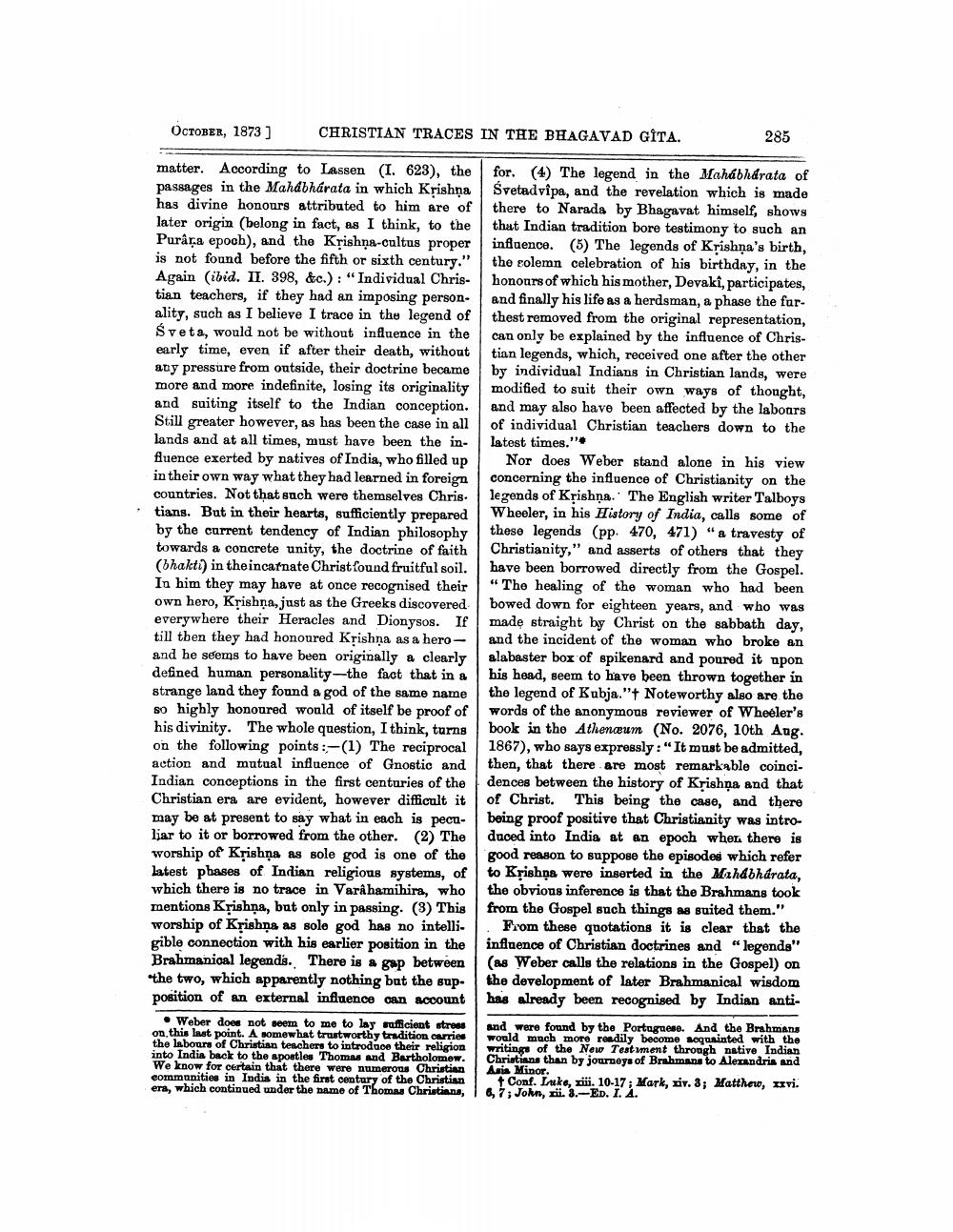________________
OCTOBER, 1873 ]
CHRISTIAN TRACES IN THE BHAGAVAD GITA.
285
matter. According to Lassen (I. 623), the for. (4) The legend in the Mahabharata of passages in the Mahabharata in which Krishna Svetadvipa, and the revelation which is made has divine honours attributed to him are of there to Narada by Bhagavat himself, shows later origin (belong in fact, as I think, to the that Indian tradition bore testimony to such an Purâșa epoch), and the Krishna-cultus proper influence. (5) The legends of Krishna's birth, is not found before the fifth or sixth century." the solemn celebration of his birthday, in the Again (ibid. II. 398, &c.): "Individual Chris- honours of which his mother, Devaki, participates, tian teachers, if they had an imposing person. and finally his life as a herdsman, a phase the furality, such as I believe I trace in the legend of thest removed from the original representation, Sveta, would not be without influence in the can only be explained by the influence of Chrisearly time, even if after their death, without tian legends, which, received one after the other any pressure from ontside, their doctrine became by individual Indians in Christian lands, were more and more indefinite, losing its originality modified to suit their own ways of thonght, and suiting itself to the Indian conception. and may also have been affected by the labours Still greater however, as has been the case in all of individual Christian teachers down to the lands and at all times, must have been the in- latest times." fluence exerted by natives of India, who filled up Nor does Weber stand alone in his view in their own way what they had learned in foreign concerning the influence of Christianity on the countries. Not that such were themselves Chris. legends of Krishna. The English writer Talboys tians. But in their hearts, sufficiently prepared
Wheeler, in his History of India, calls some of by the current tendency of Indian philosophy these legends (pp. 470, 471) "a travesty of towards a concrete unity, the doctrine of faith Christianity," and asserts of others that they (bhakti) in theincarnate Christ found fruitful soil. have been borrowed directly from the Gospel. In him they may have at once recognised their “The healing of the woman who had been own hero, Krishna, just as the Greeks discovered bowed down for eighteen years, and who was everywhere their Heracles and Dionysos. If made straight by Christ on the sabbath day, till then they had honoured Krishna as a hero - and the incident of the woman who broke an and he seems to have been originally a clearly alabaster box of spikenard and poured it upon defined human personality-the fact that in & his head, seem to have been thrown together in strange land they found a god of the same name the legend of Kubja."+ Noteworthy also are the so highly honoured would of itself be proof of words of the anonymous reviewer of Wheeler's his divinity. The whole question, I think, turns book in the Athenæum (No. 2076, 10th Aug. on the following points :-(1) The reciprocal 1867), who says expressly:"It must be admitted, action and mutual influence of Gnostic and then, that there are most remarkable coinciIndian conceptions in the first centuries of the dences between the history of Kộishna and that Christian era are evident, however difficult it of Christ. This being the case, and there may be at present to say what in each is pecu- being proof positive that Christianity was introliar to it or borrowed from the other. (2) The duced into India at an epoch when there is worship of Krishna as sole god is one of the good reason to suppose the episodes which refer latest phases of Indian religious systems, of to Krishna were inserted in the Mahdbharata, which there is no trace in Varahamihira, who
the obvions inference is that the Brahmans took mentions Krishna, but only in passing. (3) This from the Gospel such things as suited them." worship of Krishna as solo god has no intelli. 1. From these quotations it is clear that the gible connection with his earlier position in the influence of Christian doctrines and "legends" Brahmanical legends. There is a gap between (as Weber calls the relations in the Gospel) on "the two, which apparently nothing but the sup- the development of later Brahmanical wisdom position of an external influence can account has already been recognised by Indian anti
Weber does not seem to me to lay rufficient stress and were found by the Portagaese. And the Brahmans on this last point. A somewhat trustworthy tradition carries would much more readily become sequinted with the the labours of Christian teachers to introduce their religion writings of the New Testament throngh native Indian into India back to the Apostles Thomas and Bartholomow.
1 Christians than by journeys of Brahmans to Alexandris and We know for certain that there were numerous Christian Asia Minor. communities in India in the first century of the Christian Conf. Luke, xiii. 10-17; Mark, xiv. 3; Matthew, uvi. era, which continued under the name of Thomas Christiana, 1,7; John, tü. .-Ed.I.A.




